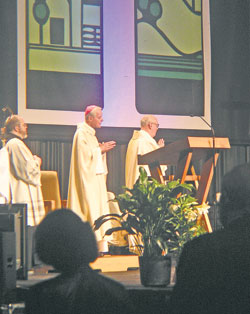NCEA Convention
Seeing with the eyes of faith:
Archbishop says Catholic education is part of great Christian witness

Benedictine Father Julian Peters, left, interim director of liturgy for the Archdiocese of Indianapolis and administrator pro-tem of SS. Peter and Paul Cathedral Parish in Indianapolis, Archbishop Donald W. Wuerl of Washington, and Msgr. Joseph F. Schaedel, vicar general of the Archdiocese of Indianapolis, listen to the petitions read on March 27 during the closing Mass at the National Catholic Educational Association convention in Indianapolis. (Photo by Brandon A. Evans)
Criterion staff report
Catholic education is part of the great Christian witness, Archbishop Donald W. Wuerl of Washington told educators during the closing Mass at the 105th annual National Catholic Educational Association convention on March 27 at the Indiana Convention Center in Indianapolis.
“Because we see with the eyes of faith, because we are connected to the Apostles and the Gospel message,” Archbishop Wuerl said, “we, too, can be witnesses of the faith, witnesses of the Resurrection.
“What we teach—what we witness—is Christ risen!”
Catholic education, in whatever form, the archbishop said in his homily, has as its primary task the communication of the person and message of Christ. This takes place through a wide range of efforts, but the goal is always the same, he added.
“We help to open the eyes and hearts to the Good News that Christ is risen. In our Catholic elementary and secondary schools, parish religious education programs, adult faith formation, the Rite of Christian Initiation of Adults [and] sacramental formation programs,” Archbishop Wuerl noted, “as well as in youth ministry, campus ministry, Catholic institutions of higher learning and, in a particular way, in our seminaries, the threads of the encounter with Christ and his life-giving message are woven into the fabric of our human experience.”
Catholic educators bring their faith to the human experience, and what they try to communicate is an understanding of life that only faith can provide, the archbishop said.
“We are the voice and example of the great millennia-long testimony that Christ is risen, and calls each of us to new life,” he said.
This could be the reason that people in Catholic education bring enthusiasm and commitment to their task, Archbishop Wuerl continued.
“We recognize that in our educational-catechetical initiatives something much more is transpiring than the communication of information,” he said. “We work with those entrusted to our care to share a vision, encourage a way of life and, thus, actually participate in the manifestation of God’s kingdom coming to be among us. This is no small task, but it is one that we embrace with joy and ardor.”
Evangelization is not just a personal encounter with Christ, the archbishop said, but an effort to permeate the culture with our Christian belief.
Catholic institutions, he added, are not simply organizations of Catholics motivated by Gospel ideals.
“Institutionally, they bring to our community an organized proclamation capable of articulating our most deeply held values in a way that makes an impact on the whole community,” Archbishop Wuerl said. “The Gospel vision is meant to transform all of society. What we are a part of is the coming to be of a whole ‘new creation.’ ”
Archbishop Wuerl noted that there will always be challenges associated with faith-based education efforts, but what “marks the current moment is a deepening awareness of both the importance of what we do and the expert way in which we do it.”
When looking to the future of Catholic education, “we should do so with hope, confidence and enthusiasm, knowing that we bring something to those we teach that no one else can,” Archbishop Wuerl said. “We share the story of Jesus.” †
